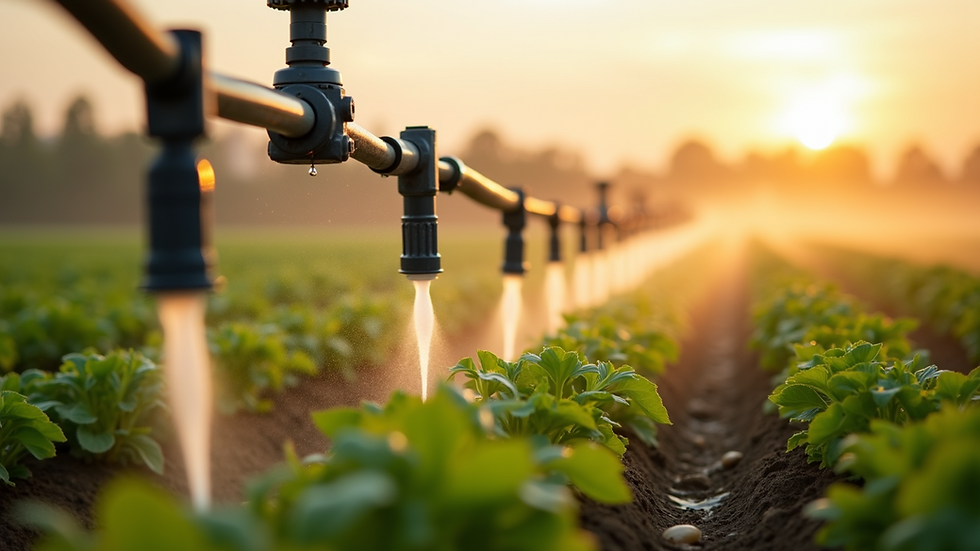Driving Sustainable Growth in the Agriculture Sector
- Sam patil
- Sep 22, 2025
- 3 min read
The agriculture sector is evolving rapidly. To meet rising food demands and environmental challenges, we must focus on eco-sustainable farming. This approach balances productivity with environmental care. It ensures long-term benefits for the land, farmers, and consumers. In this post, I will share practical strategies to drive sustainable growth in agriculture. These strategies help agribusinesses, farm producers, aggregators, NGOs, and seed companies thrive while protecting natural resources.
Embracing Eco-Sustainable Farming Practices
Eco-sustainable farming is about using methods that protect the environment and improve farm productivity. It involves reducing chemical inputs, conserving water, and enhancing soil health. These practices lead to healthier crops and better yields over time.
Some key eco-sustainable farming techniques include:
Crop rotation: Alternating crops to improve soil nutrients and reduce pests.
Integrated pest management (IPM): Using natural predators and minimal chemicals to control pests.
Organic fertilizers: Applying compost and manure instead of synthetic fertilizers.
Water-efficient irrigation: Drip irrigation and rainwater harvesting to save water.
Implementing these methods reduces costs and environmental impact. It also builds resilience against climate change. For example, crop rotation breaks pest cycles and improves soil structure, leading to higher yields without extra inputs.

Leveraging Technology for Eco-Sustainable Farming
Technology plays a crucial role in advancing eco-sustainable farming. Modern tools help monitor crop health, optimize resource use, and improve decision-making. Using data-driven insights leads to better farm management and increased profitability.
Some technologies to consider:
Precision agriculture: GPS and sensors guide planting, fertilizing, and harvesting with accuracy.
Farm management software: Tracks inputs, outputs, and finances in real time.
Drones and satellite imagery: Provide aerial views to detect crop stress and pest outbreaks early.
Soil sensors: Measure moisture and nutrient levels to optimize irrigation and fertilization.
By adopting these technologies, farms can reduce waste and increase efficiency. For example, precision agriculture ensures fertilizers are applied only where needed, cutting costs and environmental harm.

Enhancing Supply Chain Efficiency
Efficient supply chains are vital for sustainable growth. Reducing waste and improving logistics lowers costs and environmental footprints. It also ensures fresh produce reaches markets faster.
Key steps to enhance supply chain efficiency:
Streamline inventory management: Use ERP solutions to track stock and demand.
Optimize transportation routes: Reduce fuel use and delivery times.
Improve storage facilities: Use cold storage to extend shelf life and reduce spoilage.
Collaborate with partners: Share data and resources to improve coordination.
FpoGrow’s Agriculture ERP solutions help agribusinesses manage these aspects seamlessly. Real-time data and analytics enable quick responses to market changes and operational challenges.

Building Resilience Through Sustainable Agricultural Growth
Sustainable agricultural growth is essential for long-term success. It means expanding production while preserving resources and supporting communities. This growth requires innovation, collaboration, and commitment.
To build resilience:
Invest in climate-smart agriculture techniques.
Promote diversified cropping systems to reduce risks.
Support smallholder farmers with training and access to markets.
Encourage policy frameworks that incentivize sustainable practices.
By focusing on these areas, the agriculture sector can meet future food demands without degrading the environment. For more information on sustainable agricultural growth, visit FpoGrow’s about page.
Driving Profitability with Data-Driven Insights
Profitability is a key goal for any agribusiness. Eco-sustainable farming combined with data-driven management unlocks new opportunities. Using analytics, businesses can identify cost-saving measures and growth areas.
Practical ways to use data for profitability:
Monitor crop performance and adjust inputs accordingly.
Forecast market demand to plan production and sales.
Track labor and equipment efficiency to reduce overheads.
Analyze supply chain data to minimize delays and losses.
FpoGrow’s ERP platform integrates these data points into one system. This integration empowers decision-makers to act quickly and confidently.
Moving Forward with Confidence
Driving sustainable growth in agriculture is achievable with the right strategies. Eco-sustainable farming practices, technology adoption, supply chain optimization, and data-driven insights form a strong foundation. These elements work together to boost productivity, protect resources, and increase profitability.
By embracing these approaches, agribusinesses and related stakeholders can lead the way in transforming agriculture. The future of farming depends on sustainable, efficient, and innovative solutions. Together, we can build a resilient agriculture sector that feeds the world responsibly.

Comments